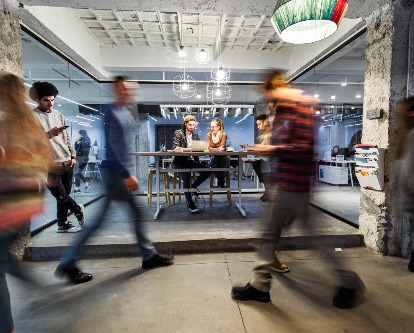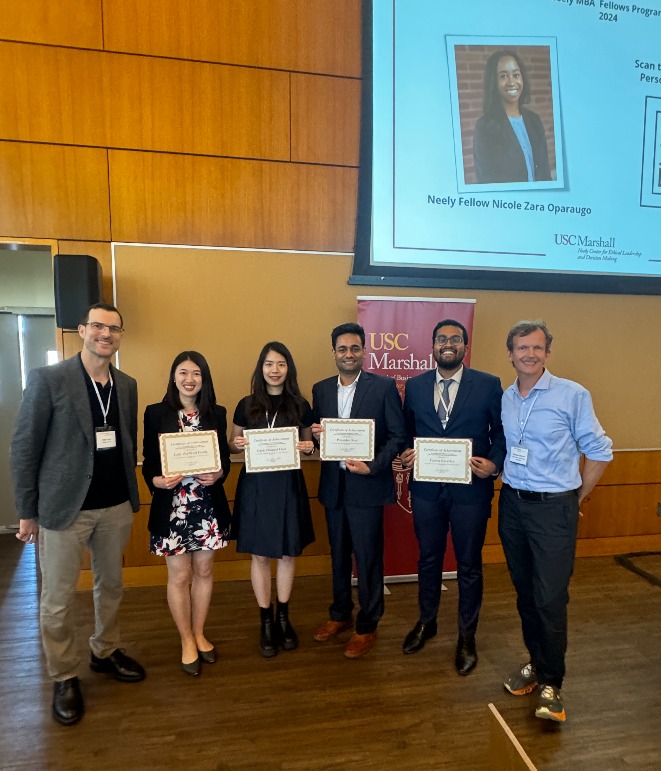
Understanding Hidden Interaction Codes that Drive Business Success
A new study from Associate Vice Dean Peer Fiss and a former Marshall PhD students found that “category interaction codes” influence how consumers evaluate, buy, and use products.
Neely Fellows Unveil XR Research
Neely Fellows Unveil XR Research
The inaugural cohort presented their research into immersive technology along with industry experts and insiders.

Nathanael Fast (left) and Carsten Becker (right) award the Neely Fellows' their certificates.
[Photo courtesy of Parama Sigurdsen]
Since its founding in 2017, the Neely Center for Ethical Leadership and Decision Making has addressed problems posed by emerging technologies, be it social media, artificial intelligence, or virtual reality. This year, the center furthered efforts a step further with the creation of the Neely Ethics and Technology Fellows Program, empowering five MBA students to become leaders in transformative technology.
The inaugural cohort of 2023–2024 investigated the implications of extended reality (XR) — encompassing augmented reality (AR), virtual reality (VR), and mixed reality (MR) — and its ripple effects on areas such as gaming, entertainment, fashion, healthcare, and the environment. The fellows presented their research at the culminating event, which also included panel discussions from key industry experts and the announcement of the Neely Purpose-Driven XR Library. The event took place on June 21 at the Ronald Tutor Campus Center at USC.
“[Immersive Technology] has been around for a long time, and we’ve gone through many cycles of hype and excitement,” said Nathanael Fast, director of the Neely Center, in his opening remarks. “But each time we go through a cycle, the technology is getting better and better and better. … We remain very excited about the potential for societal benefit from extended reality, virtual and augmented reality, and spatial computing.”
Avi Bar-Zeev, a VR/AR consultant and pioneer who has worked for Apple, Microsoft, and Disney, provided the keynote address. Bar-Zeev scrutinized new advancements in advertising and data collection. He particularly focused on eye tracking within VR devices, technology that enables companies to gather information about a user’s emotions, desires, and tendencies.
“If somebody knows our exact emotional buttons to push, they can get us into a state of being emotional, less conscious, less rational, and then send us the ad,” Bar-Zeev explained.
By gathering a person’s unique information, businesses can learn a lot about a customer’s inner life and, therefore, more effectively market to them. Bar-Zeev even posited a future in which tech companies incorporated product placement into the social media posts of a user’s family and friends. And his fears go beyond mere advertising.
“The threat is that we lose our mental freedom,” Bar-Zeev warned. “We lose our ability to think for ourselves. If we go too far down that road, we lose the ability to stop it because we won’t even be able to speak out against it if they control the channel of communication. That’s why we need protection and that’s why we need to focus on ethics.”
The first of the fellows, Tejaswa Gavankar MBA ’24, echoed Bar-Zeev’s concerns about data collection and privacy. Gavankar explained that advertisers value one commodity above all others: attention.
As he explained, corporations pay approximately $7 million for a 30-second spot during the Super Bowl when over 120 million eyes are locked onto the same screen. Similarly, drink and food companies pay extravagant sums to place their product at eye-level shelves in grocery stores. They’re investing in customer awareness.
We remain very excited about the potential for societal benefit from extended reality, virtual and augmented reality, and spatial computing.
— Nathanael Fast
Director, Neely Center
Gavankar believes VR/AR will change this calculation for companies. Instead of buying air time, advertisers will be purchasing eyeline.
“Imagine if you all are looking at an [empty screen], and in the perfect place, a personal ad comes in,” Gavankar said in his presentation. “It’s going to be much cheaper. It’s going to be much, much more effective.”
The ethical dilemmas of these technologies were at the forefront of several presentations, asking questions like: How do companies create safe virtual spaces for children? How can these advancements aid medical procedures? Is there a way to incorporate AR into fashion to reduce pollution?
Callie Huang explored the lattermost question. She suggested that virtual try-ons could be the future of fashion, enabling shoppers to use an AR application to see how clothes fit at home. If effective, the technology could reduce the amount of online returns and decrease harmful emissions by limiting production.
“For now, these products are piling up in Amazon’s warehouse,” Huang said. “But with the concept of ‘fashion on demand’ … [customers] can place the order and then the designer can manufacture it later.”
The conference also featured a panel discussion titled “Creating Healthy Immersive Futures For All.” In addition to Bar-Zeev, Neely welcomed Sonya Haskins, head of programming at AWE, and April Boyd Naranha, CEO of XR Safety Initiative. Much of the conversation centered around the regulation and protection of XR spaces, emphasizing that a person may be just as traumatized while in virtual reality as in the physical world.
“You can’t unsee what you saw,” Naranha said, reiterating that all people — especially children — must be safeguarded from online predatory behavior.
The event finished with the announcement of the Neely Purpose-Driven XR Library, a new online catalog providing access to dozens of AR/VR technologies by searching for sector, technology class, and type. Carsten Becker — a lecturer in design and communication at the USC Iovine and Young Academy and a co-founder of the library — introduced the website at the conference.
Becker explained that he and the team combed through nearly 100 XR products and apps, selecting 22 with the highest potential impact.
“We were looking for real utility and something that generates change — not just translates something that I can do in real life into a different way of doing it,” Becker said.
Chosen applications include a spatial audio experience for people with impaired vision, an integrated surgery accompaniment, and a kid-friendly program that allows users to manipulate 3D models. Neely will continue to add VR/AR resources as they become available, planning to make the library a comprehensive database for all things XR.
RELATED
Understanding Hidden Interaction Codes that Drive Business Success
A new study from Associate Vice Dean Peer Fiss and a former Marshall PhD students found that “category interaction codes” influence how consumers evaluate, buy, and use products.
MBV Education Helps Veteran Transition From Military into Defense Career at Anduril
With the backing of his degree and the support of the Trojan Network, Randall Parkes MBV ’21 seized an opportunity in cutting-edge defense technology.
Marshall Faculty Publications, Awards, and Honors: October 2025
We are proud to highlight the many accomplishments of Marshall’s exceptional faculty recognized for recently accepted and published research and achievements in their field.
Knight Foundation and USC Marshall Commit $4 Million to Advance Purpose-Driven AI Research
The research initiative aims to create ethical, human-forward outcomes for cutting-edge technology like AI.
Sports Leaders Discuss Athlete Business Savvy, LA28, and Student Learning Opportunities at Next Level Sports Conference
Roger Goodell, Maria Sharapova, Chris Paul, and Casey Wasserman spoke at the second annual NLS Conference, hosted by USC Marshall and USC Annenberg.